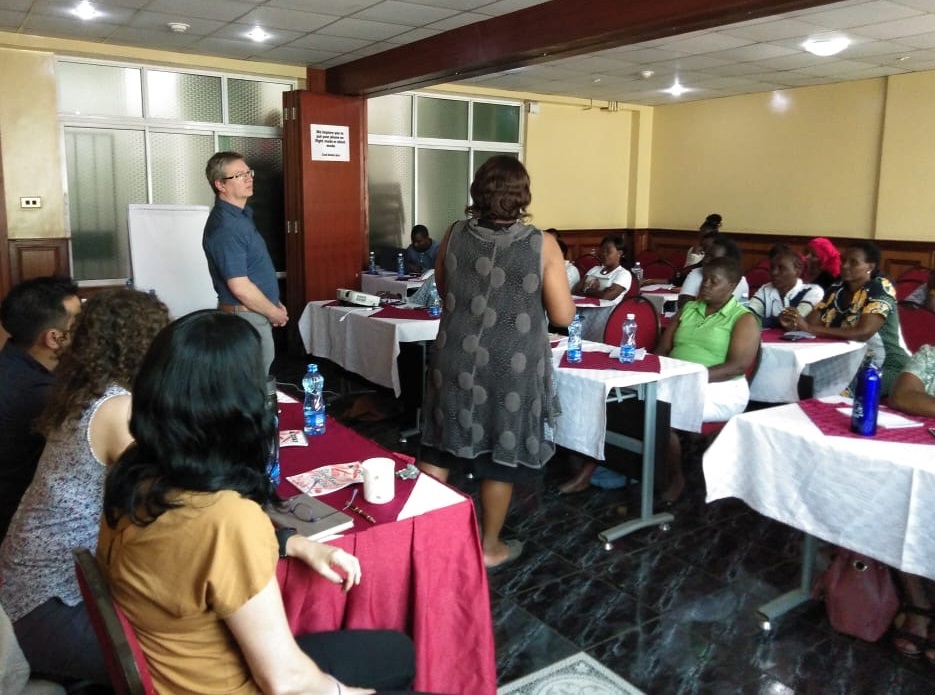
Dr. Keith Fowke, head, medical microbiology and infectious diseases, Max Rady College of Medicine, Rady Faculty of Health Sciences, and Rosemary Kasiba, a peer educator, speak at a knowledge exchange event in Nairobi, Kenya.
UM and University of Nairobi celebrate 40 years of high-impact collaboration
The University of Manitoba is marking the 40th anniversary of a research partnership with the University of Nairobi that has led to groundbreaking discoveries in the areas of HIV/AIDS and other sexually transmitted infections.
The milestone will be celebrated on Jan. 27 at the University of Nairobi STD/HIV/SRH Collaborative Research Group meeting in Nairobi, Kenya. The annual conference on sexually transmitted disease, human immunodeficiency viruses and sexual and reproductive health research takes place from Jan. 27 to 31.
The UM/University of Nairobi partnership has received millions of dollars in funding from the Bill and Melinda Gates Foundation. It has received global recognition as a best-practice example of North-South research collaboration.
The partners’ important discoveries include that HIV can be spread from mother to child through breastfeeding and that sexually transmitted diseases like gonorrhea and chlamydia increase susceptibility to HIV infection.
“The collaboration has made a huge impact,” said Dr. Keith Fowke, head, medical microbiology and infectious diseases, Max Rady College of Medicine, Rady Faculty of Health Sciences.
“The University of Manitoba has been a global leader in making cutting-edge contributions to understanding HIV and other sexually transmitted infections for the last 40 years, thanks to this partnership with the University of Nairobi.”
In 1986, when it was thought that HIV only affected gay men, UM researchers decided to test women sex workers in Nairobi for the virus. They found that 60 per cent were infected with HIV, showing that women could, in fact, acquire the virus.
Research led by UM professor Dr. Stephen Moses demonstrated that circumcision reduces men’s risk of HIV infection by 50 to 60 per cent. This captured headlines – Time magazine heralded it as the most important medical breakthrough of 2007 – and helped kick-start programs to expand circumcision services throughout eastern and southern Africa.
Medical microbiologist Dr. Frank Plummer, now distinguished professor emeritus, led a team – including Fowke, then a graduate student – in discovering that some Kenyan women sex workers were naturally immune to HIV infection. The research focused on the women’s immune systems and genetics to identify the basis for this resistance. The project provided vital new information for HIV vaccine and drug development.
Global interventions and campaigns built on this work currently save tens of thousands of lives annually. UM researchers are now carrying out clinical trials looking at how to duplicate this unique immune system in other women using aspirin.
Plummer’s Kenya AIDS Control Program generated much of what we now know about the HIV epidemic in Africa and has had enormous impact on global sexually transmitted infection (STI) health policy. Its syndromic approach to STI management led to a 25 per cent decrease in STIs in program clinics and up to a 40 per cent decrease in other clinics to which this approach has been disseminated, such as those in Uganda, Cambodia, Thailand and southern India.
“A lot of people in Kenya have not acquired HIV, or have been cured of their bacterial sexually transmitted infections, because of this collaboration, which has also led to the University of Nairobi being recognized as a leader in this area of research,” Fowke said.
The UM/Nairobi University collaboration began in 1980, when Dr. Herbert Nzanze, head of the department of medical microbiology at the University of Nairobi, invited Dr. Allan Ronald, a UM research pioneer in the field of infectious diseases (now a distinguished professor emeritus), to Nairobi to study sexually transmitted chancroid infections.
Today, the collaboration includes several other universities, including the University of Washington, the University of Ghent, the University of Toronto, McMaster University and the University of California.
“For four decades, this world-class collaboration has been at the forefront of STI research,” said Dr. Brian Postl, dean, Max Rady College of Medicine and dean, Rady Faculty of Health Sciences.
“I commend the scientists who have worked so hard over the years to build this innovative partnership. The future of the collaboration looks bright as many young faculty have come on board to carry on this crucial research.”
The conference will kick off with presentations about the history of the collaboration and the impact of the research. To celebrate the anniversary, attendees at the conference will include UM President and Vice-Chancellor Dr. David Barnard, UM Vice-President (Research and International) Dr. Digvir Jayas and Dr. Charu Kaushic, scientific director, Canadian Institutes of Health Research Institute of Infection and Immunity.






